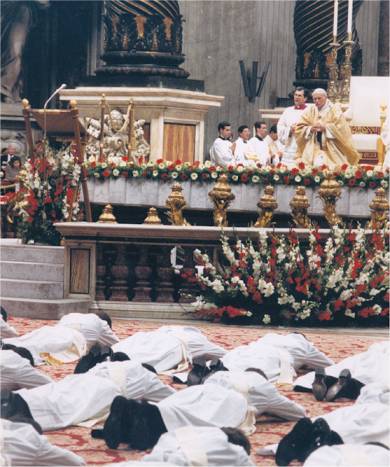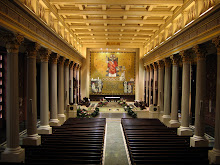As we celebrate the Feast of the Chair of Peter, it seems like a strange thing to celebrate. It is a chair, afterall. Is this another of those particularly Catholic things that we do? Yes, but why do we do this?
The simpliest answer is that this comes down to authority, that the authority that Jesus passed on to Peter in today's Gospel account has been passed down to his successors over the years. This authority is expressed, then, in two realms: teaching authority and unity.
Teaching Authority
I was struck by reading 'Journey's Home' from the Coming Home Network that so many of the conversion stories revolved around the idea of authority. Who has the authority to interpret Scriptures? Who has the authority to tell me how to live? Moving farther afield, who even has the authority to say which books are in the Scripture?
Protestants have two main tenants that they live by: sola scriptura and sole fidei. The issue is, however, where do they find these tenants? The Bible includes neither, expressly. In fact, 'Faith alone' as two distinct words only appear in the Letter to James where he he blasts those who argue for faith alone, whereas I will show you the faith that underlies my work. Similarly, 'Scripture alone' cannot be held up from the Scriptures; for example the story of Philip and the Ethiopian Eunuch from the Acts of the Apostles: "How can I understand it unless someone interprets it for me?"
What comes to light, if you study the history of the Church, is that these two positions were only first proposed by the Reformers. When ideas such as these came up in the Early Church, they were soundly condemned. So that claim about the Reformers returning to the faith of the Early Church...
Unity
But this authority, while authoratative, is not authoratarian. It is at the service of the Church's unity. The Holy Father has the obligation to help clarify the deposit of faith, specifically when items are challenged. For example, even though the 27 books of the New Testament were first outlined as early as the third/fourth century; they were not officially declared by the Church until the Council of Trent, because the Reformers wanted to dismiss the Letter of James, for example. There was no need to clarify, because things were already held in common.
The Holy Father has the role to say that 'To be Catholic, you must be within these lines.' Outside of this, you cannot be Catholic because your position is contrary to the Deposit of Faith. Sure, we wish that he would come down stronger on some, but I feel there are often communications below the table to give the suspect a chance to recant.
The military analogy works well, here. If an army is clear and concise and has a firm goal to achieve, and all know what their role is, even if they meet a stronger opponent, they can still take the hill. Just so, the Pope is the leader, who shares his authority with his co-workers, the Bishops, who pass along their authority to their priests, who exercise their authority in the field/vineyard of the Lord.
This feast is a vitally important one for the fact that if we did not have this unifying authority within the Church, we end up split and fractured and broken like so many of our Protestant brethren. When the question of authority comes up, they split. How unScriptural, I feel.
One last thing, please do not read this as an attack against Protestantism. I have many dear friends who are firm believers in different Protestant communions. They are sincere followers of Christ. I have disagreements with the idea of Protestantism, and I certainly pray that we all might be one, as Jesus is One with His Heavenly Father.
Subscribe to:
Post Comments (Atom)










6 comments:
Forgive the correction, Father, but I think you mean St. James blasts those who argue for "faith alone"?
(It took me a minute to figure out what you meant, so I figured others might get confused too.)
Kasia,
All better now, still suffering from jet lag apparently.
(By the way, corrections always welcome.)
and i appreciate your last comments regarding the many Protestants who are firm and sincere believers. there are many in the pews in all our churches who do not have a clue about the teachings of their particular tradition. there is one deposit of faith - we all should be seeking it.
there are many who make the jump at great risk and cost - desire for unity needs be manifested by understanding the source of the differences so dialogs can take place. conversion comes from the Lord. for our part, we share our understanding and let it plant the seeds, or cultivate the thoughts already ruminating and perhaps resounding in the heart of the seeker.
"You cannot take God as your Father unless you take Mary as your Mother" ~ St. Cyprian
The early Church Fathers proclaimed Unity with great passion. That we should obey our bishops as we would obey Jesus Christ, that we should obey the word from Rome as we would obey God.
God never intended disunity, and I believe that a great number of Protestants would be greatly distressed to find their religiosu aligned with heresies defined in the first centuries after the deah and resurrection of Christ. We must be gentle with Protestants...because their desire is, like us, to know and to serve Christ with their entire being.
Wasn't it Cardinal Newman who said that to delve deep into history meant to cease to be Protestant?
(And wasn't he the same to say that the skulls of bishops pave the road to Hell?)
I understand why, now. They have a great responsibility. Thank God I'm just a blogger...maybe only my ribs will pave that road...
um, that word should read "Religions"
Adoro,
You are correct on the statements attributed to Cardinal Newman, and they are correct. (All too correct on that last point, YIKES!)
Post a Comment